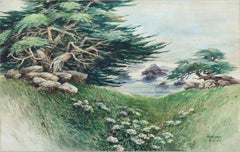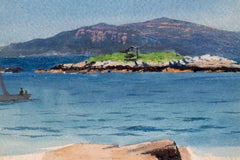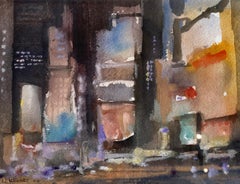Margaret Eifler Art
to
1
Overall Width
to
Overall Height
to
1
1
1
1
1
1
1
1
1
1
1
10,138
2,779
1,375
1,369
1
Artist: Margaret Eifler
Vintage Carmel Landscape -- Shore Cypress
By Margaret Eifler
Located in Soquel, CA
Beautiful watercolor of windswept Carmel Cypress by Margaret C. Eifler (American, 1910-1996), circa 1967. Signed lower right corner; gallery label on ve...
Category
1960s American Impressionist Margaret Eifler Art
Materials
Watercolor, Laid Paper
Related Items
Charles Partridge Adams California Coastal Watercolor, American Impressionist
By Charles Partridge Adams
Located in Denver, CO
This exquisite California coastal watercolor by American Impressionist Charles Partridge Adams (1858–1942) captures the serene beauty of the shoreline in vibrant hues of blue, green,...
Category
1920s American Impressionist Margaret Eifler Art
Materials
Watercolor
$1,495
H 12.25 in W 15.25 in D 2.5 in
Contemporary Impressionist Painting 'Signs and Lights on Broadway'
By Lawrence Kelsey
Located in White Plains, NY
'Signs and Lights on Broadway' 2005 by American artist, Lawrence Kelsey. Gouache, 7.5 x 10 in. / Frame: 16.5 x 20.5 in. Depicting a night view of New York City, this impressionistic...
Category
Early 2000s American Impressionist Margaret Eifler Art
Materials
Gouache
$1,200
H 16.5 in W 20.5 in
METCALF American Impressionist Landscape Watercolor
By Willard LeRoy Metcalf
Located in New York, NY
Willard Metcalf (1858-1925) was an important American Impressionist, member of the American Watercolor Society, and teaching at Cooper Union and the Art Student's League.
This comp...
Category
Early 20th Century American Impressionist Margaret Eifler Art
Materials
Watercolor
$2,800
H 17.5 in W 23.5 in
Contemporary Impressionist Painting by Lawrence Kelsey 'The New 42nd Street'
By Lawrence Kelsey
Located in White Plains, NY
'The New 42nd Street' 2004-2005 by American artist, Lawrence Kelsey. Gouache, 8 x 10.25 in. / Frame: 16.5 x 20.5 in. Depicting a night view of 42nd Street in New York City, this impr...
Category
Early 2000s American Impressionist Margaret Eifler Art
Materials
Gouache
"Beach House Scene" American Impressionist Coastal Landscape Watercolor on Paper
By Martha Walter
Located in New York, NY
This piece is a playful depiction of a beach house scene of the ocean, sand, and view of a house with its garden with joyful colors and precious deta...
Category
Early 20th Century American Impressionist Margaret Eifler Art
Materials
Paper, Watercolor
$6,000
H 20.75 in W 22.5 in D 1.5 in
"Train Station, " Max Kuehne, Industrial City Scene, American Impressionism
By Max Kuehne
Located in New York, NY
Max Kuehne (1880 - 1968)
Train Station, circa 1910
Watercolor on paper
8 1/4 x 10 1/4 inches
Signed lower right
Provenance:
Private Collection, Illinois
Max Kuehne was born in Halle, Germany on November 7, 1880. During his adolescence the family immigrated to America and settled in Flushing, New York. As a young man, Max was active in rowing events, bicycle racing, swimming and sailing. After experimenting with various occupations, Kuehne decided to study art, which led him to William Merritt Chase's famous school in New York; he was trained by Chase himself, then by Kenneth Hayes Miller. Chase was at the peak of his career, and his portraits were especially in demand. Kuehne would have profited from Chase's invaluable lessons in technique, as well as his inspirational personality. Miller, only four years older than Kuehne, was another of the many artists to benefit from Chase's teachings. Even though Miller still would have been under the spell of Chase upon Kuehne's arrival, he was already experimenting with an aestheticism that went beyond Chase's realism and virtuosity of the brush. Later Miller developed a style dependent upon volumetric figures that recall Italian Renaissance prototypes.
Kuehne moved from Miller to Robert Henri in 1909. Rockwell Kent, who also studied under Chase, Miller, and Henri, expressed what he felt were their respective contributions: "As Chase had taught us to use our eyes, and Henri to enlist our hearts, Miller called on us to use our heads." (Rockwell Kent, It's Me O Lord: The Autobiography of Rockwell Kent. New York: Dodd, Mead and Co., 1955, p. 83). Henri prompted Kuehne to search out the unvarnished realities of urban living; a notable portion of Henri's stylistic formula was incorporated into his work.
Having received such a thorough foundation in art, Kuehne spent a year in Europe's major art museums to study techniques of the old masters. His son Richard named Ernest Lawson as one of Max Kuehne's European traveling companions. In 1911 Kuehne moved to New York where he maintained a studio and painted everyday scenes around him, using the rather Manet-like, dark palette of Henri.
A trip to Gloucester during the following summer engendered a brighter palette. In the words of Gallatin (1924, p. 60), during that summer Kuehne "executed some of his most successful pictures, paintings full of sunlight . . . revealing the fact that he was becoming a colorist of considerable distinction." Kuehne was away in England the year of the Armory Show (1913), where he worked on powerful, painterly seascapes on the rocky shores of Cornwall. Possibly inspired by Henri - who had discovered Madrid in 1900 then took classes there in 1906, 1908 and 1912 - Kuehne visited Spain in 1914; in all, he would spend three years there, maintaining a studio in Granada. He developed his own impressionism and a greater simplicity while in Spain, under the influence of the brilliant Mediterranean light. George Bellows convinced Kuehne to spend the summer of 1919 in Rockport, Maine (near Camden). The influence of Bellows was more than casual; he would have intensified Kuehne's commitment to paint life "in the raw" around him.
After another brief trip to Spain in 1920, Kuehne went to the other Rockport (Cape Ann, Massachusetts) where he was accepted as a member of the vigorous art colony, spearheaded by Aldro T. Hibbard. Rockport's picturesque ambiance fulfilled the needs of an artist-sailor: as a writer in the Gloucester Daily Times explained, "Max Kuehne came to Rockport to paint, but he stayed to sail." The 1920s was a boom decade for Cape Ann, as it was for the rest of the nation. Kuehne's studio in Rockport was formerly occupied by Jonas Lie.
Kuehne spent the summer of 1923 in Paris, where in July, André Breton started a brawl as the curtain went up on a play by his rival Tristan Tzara; the event signified the demise of the Dada movement. Kuehne could not relate to this avant-garde art but was apparently influenced by more traditional painters — the Fauves, Nabis, and painters such as Bonnard. Gallatin perceived a looser handling and more brilliant color in the pictures Kuehne brought back to the States in the fall. In 1926, Kuehne won the First Honorable Mention at the Carnegie Institute, and he re-exhibited there, for example, in 1937 (Before the Wind). Besides painting, Kuehne did sculpture, decorative screens, and furniture work with carved and gilded molding. In addition, he designed and carved his own frames, and John Taylor Adams encouraged Kuehne to execute etchings. Through his talents in all these media he was able to survive the Depression, and during the 1940s and 1950s these activities almost eclipsed his easel painting. In later years, Kuehne's landscapes and still-lifes show the influence of Cézanne and Bonnard, and his style changed radically.
Max Kuehne died in 1968. He exhibited his work at the National Academy of Design, the Art Institute of Chicago, the Carnegie Institute in Pittsburgh, the Memorial Art Gallery of the University of Rochester, and in various New York City galleries. Kuehne's works are in the following public collections: the Detroit Institute of Arts (Marine Headland), the Whitney Museum (Diamond Hill...
Category
1910s American Impressionist Margaret Eifler Art
Materials
Paper, Watercolor
$2,800 Sale Price
20% Off
H 13.5 in W 15.5 in
PA Impressionist Landscape painting Old Mill Darby Creek
Located in Wilton Manors, FL
John J. Dull (1859-1949).
Old Mill, Darby Creek. ca. 1930.
Watercolor on paper, image measures 11 x 14 inches. Framed measurement: 16 x 20 inches.
Signed lower right. Original ex...
Category
1920s American Impressionist Margaret Eifler Art
Materials
Watercolor
$750
H 20 in W 16 in D 0.5 in
"Forest Landscape" John F. Carlson, circa 1925 American Impressionist Landscape
By John F. Carlson
Located in New York, NY
John F. Carlson
Forest Landscape, circa 1925
Signed lower right
Watercolor on paper
Sight 21 x 24 1/2 inches
The native Swede John Fabian Carlson became a household name in New Yor...
Category
1920s American Impressionist Margaret Eifler Art
Materials
Paper, Watercolor
New York Skyline the West Side with Hudson River - Vintage New York
By Frank S. Hermann
Located in Miami, FL
Rooftop view of the upper West Side Manhattan as it looked in the 1930s. There is a rough indication of a billboard and a glimpse of the Hudson River. The cluster of buildings depic...
Category
1930s American Impressionist Margaret Eifler Art
Materials
Oil, Gouache, Board
$6,500
H 13.5 in W 18.24 in
Canyon Country, 16x20, watercolor landscape, framed
By Lu Haskew
Located in Loveland, CO
Canyon Country by Lu Haskew
Pastel 16x20" image size
Additional images available upon request.
Landscape view of the Grand Canyon
ABOUT THE ARTIST: Lu Haskew 1921-2009
"Life is good to me. Being able to go to my studio five days weekly and paint for several hours, living in a supportive community, having family and friends who encourage me--all have contributed to helping me become an artist. Being fortunate to study with some of the artists I admire has kept me painting from the garden, people and my favorite things. With the support of galleries, teaching and doing demos, how could I do anything else? My goal is to try to be the best I can be by always being a student, looking for new ideas and stretching my horizons."
Upon retirement from a 33-year teaching career, Lu rented a studio in Loveland and began concentrating on
her oil and watercolor painting. Learning from artists she had followed and admired throughout the years
her painting became a full time career. Since 1992, she has studied with renowned painters Richard
Schmid, Clyde Aspevig, Joyce Pike, and others at the Scottsdale Art...
Category
1990s American Impressionist Margaret Eifler Art
Materials
Watercolor
"Monhegan Island, Maine, " Edward Dufner, American Impressionism Landscape View
By Edward Dufner
Located in New York, NY
Edward Dufner (1872 - 1957)
Monhegan Island, Maine
Watercolor on paper
Sight 16 x 20 inches
Signed lower right
With a long-time career as an art teacher and painter of both 'light' and 'dark', Edward Dufner was one of the first students of the Buffalo Fine Arts Academy to earn an Albright Scholarship to study painting in New York. In Buffalo, he had exchanged odd job work for drawing lessons from architect Charles Sumner. He also earned money as an illustrator of a German-language newspaper, and in 1890 took lessons from George Bridgman at the Buffalo Fine Arts Academy.
In 1893, using his scholarship, Dufner moved to Manhattan and enrolled at the Art Students League where he studied with Henry Siddons Mowbray, figure painter and muralist. He also did illustration work for Life, Harper's and Scribner's magazines.
Five years later, in 1898, Dufner went to Paris where he studied at the Academy Julian with Jean-Paul Laurens and privately with James McNeill Whistler. Verification of this relationship, which has been debated by art scholars, comes from researcher Nancy Turk who located at the Smithsonian Institution two 1927 interviews given by Dufner. Turk wrote that Dufner "talks in detail about Whistler, about how he prepared his canvasas and about numerous pieces he painted. . . A great read, the interview puts to bed" the ongoing confusion about whether or not he studied with Whistler.
During his time in France, Dufner summered in the south at Le Pouleu with artists Richard Emil Miller...
Category
Early 20th Century American Impressionist Margaret Eifler Art
Materials
Paper, Watercolor
Mount Monadnock
By Gifford Beal
Located in Milford, NH
A fine monochromatic watercolor landscape painting of Mount Monadnock in New Hampshire by American artist Gifford Beal (1879-1956). Beal was b...
Category
Mid-20th Century American Impressionist Margaret Eifler Art
Materials
Paper, Watercolor
Margaret Eifler art for sale on 1stDibs.
Find a wide variety of authentic Margaret Eifler art available for sale on 1stDibs. You can also browse by medium to find art by Margaret Eifler in laid paper, paint, paper and more. Much of the original work by this artist or collective was created during the 1960s and is mostly associated with the Impressionist style. Not every interior allows for large Margaret Eifler art, so small editions measuring 32 inches across are available. Customers who are interested in this artist might also find the work of Barbara Wilson, Kathleen Keifer, and William Lemos. Margaret Eifler art prices can differ depending upon medium, time period and other attributes. On 1stDibs, the price for these items starts at $1,080 and tops out at $1,080, while the average work can sell for $1,080.


